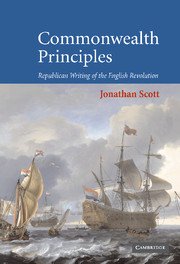Book contents
- Frontmatter
- Contents
- Preface
- Introduction: English republicanism
- Part I CONTEXTS
- Part II ANALYSIS
- Part III Chronology
- 11 Republicans and Levellers, 1603–1649
- 12 The English republic, 1649–1653
- 13 Healing and settling, 1653–1658
- 14 The good old cause, 1658–1660
- 15 Anatomies of tyranny, 1660–1683
- 16 Republicans and Whigs, 1680–1725
- Appendix: ‘a pretty story of horses’ (May 1654)
- Bibliography
- Index
15 - Anatomies of tyranny, 1660–1683
Published online by Cambridge University Press: 22 September 2009
- Frontmatter
- Contents
- Preface
- Introduction: English republicanism
- Part I CONTEXTS
- Part II ANALYSIS
- Part III Chronology
- 11 Republicans and Levellers, 1603–1649
- 12 The English republic, 1649–1653
- 13 Healing and settling, 1653–1658
- 14 The good old cause, 1658–1660
- 15 Anatomies of tyranny, 1660–1683
- 16 Republicans and Whigs, 1680–1725
- Appendix: ‘a pretty story of horses’ (May 1654)
- Bibliography
- Index
Summary
If it be said, these and other nations after wearied with civil dissensions, have sought Monarchy as their port for rest I answer; few or none of them have sought Monarchy as their rest, but have fallen or bin driven into it as a ship upon a Rock: we may as well conclude death better then life because all men doing what they can to preserve life doe yet end in death. That free states by divisions fall often into monarchy only shows Monarchy to be a state as death unto life. And as death is the greatest evil can befall a person, monarchy is the worst evil can befall a nation.
Algernon Sidney, Court Maxims [1665]But in the midst of judgement God … kept a lamp still burning in the house of David.
Ibid.INTRODUCTION
For adherents of the ‘old cause’ restoration of monarchy in 1660 was a calamity. As the Convention debated exceptions to the Act of Indemnity, the exact scale of the personal retribution to be exacted was initially unclear. Although only the twenty-nine regicides apprehended (including Thomas Scot) immediately suffered the ultimate penalty, as the Convention was replaced by the Cavalier parliament in 1661 the mood of reaction hardened. Milton, after a period in hiding and following his arrest, successfully sued for pardon. Nedham, too, remarkably survived to retire from politics and practise medicine. In December 1661, however, Harrington was arrested, examined and imprisoned.
- Type
- Chapter
- Information
- Commonwealth PrinciplesRepublican Writing of the English Revolution, pp. 315 - 335Publisher: Cambridge University PressPrint publication year: 2004



